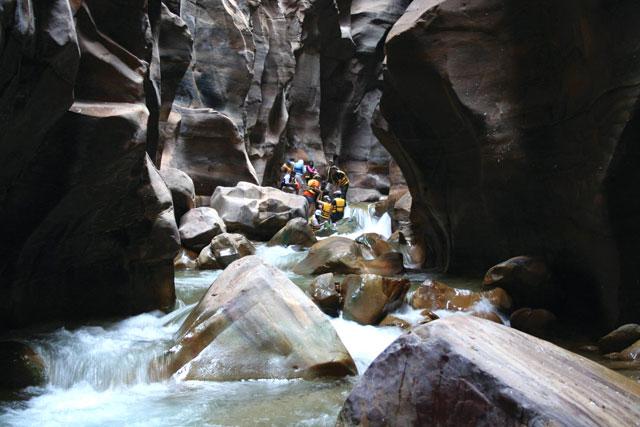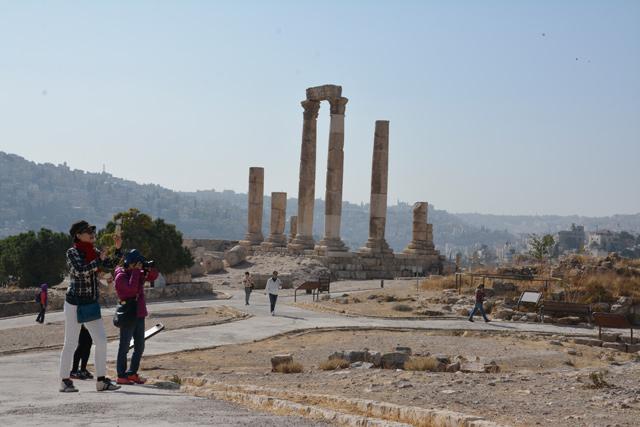You are here
Tour operators catalyse innovation for post-lockdown tourism revival
By Sean Mathews - Jun 09,2020 - Last updated at Jun 09,2020

While mass tourism is not likely to return to the Kingdom for a long time, adventure tourism is among the sub-sectors expected to make an earlier comeback, according to Omar Hazineh, who runs the Jordanian Inbound Tour Operators Association (Photo courtesy of Jordan Tourism Board)
NEW YORK — Envisioning a post-coronavirus travel world is a common feature these days within one of Jordan’s hardest-hit industries.
Rola Fayyad, a Jordanian hospitality entrepreneur, said: “Maybe road trips will be the next wave as airports remain under lockdown.”
Fayyad said she is thinking about recreational vehicles (RVs).
“I can see people in the Gulf wanting to rent cool RVs and travel to Jordan at the end of summer,” Fayyad told The Jordan Times in an online interview.
Omar Hazineh, who runs the Jordanian Inbound Tour Operators Association (JITOA) and represents around 90 businesses specialising in inbound tourism, believes that Jordan’s tourism industry will have to wait until September of 2021 for a full recovery.
“Now is the time for tour operators to start thinking like start-ups. In Jordan, they were not used to this before,” he said.
“Mass tourism that Jordan used to rely on will be gone for a long time,” Hazineh said.
“I think the come-back will first arrive on a more personal side, like those visiting religious sites or coming for adventure tourism,” he told The Jordan Times.
Ayman Abdelkareem, a tour operator who runs a start-up specialising in adventure tourism, was expecting this year to be one of his best. Now Abdelkareem has trimmed staff and is looking to increase the company’s involvement in domestic tourism to stay afloat until foreign visitors can return.
“Social distancing is already part of adventure tourism. You are outside and there is a lot of space,” he said.
“If you’re counting on the old ways to come back, you will have to shut down. In Jordan, we can no longer be resistant to change,” Abdelkareem added.
Loai Madanat is a technology and data systems entrepreneur who works in Iraq, Oman and Jordan. His company has been communicating with JITOA and is trying to work on some of those very changes.
One project is an app that will allow guests at hotels to minimise their contact with staff.
“When guests make their reservations, they will download the app. It will be linked to the hotel wifi, and from there, their mobile phone can be used for everything from room service, to finding a table at a resort in Aqaba. It will be cashless and contactless,” Madanat told The Jordan Times.
The shift towards incorporating technology in the Kingdom’s tourism industry is already under way.
Abdelkareem said that he has two employees now working solely on the IT side.
“Jordanians going on our domestic tours are not allowed to pay in cash. It is all online payments. We are automising everything in terms of bookings,” he said.
Hospitality entrepreneur Fayyad said she would like to see more of an emphasis for now on augmented reality tours. “Online experiences are really interesting, even though the income from it is very low compared with the costs,” Fayyad said.
“The Jordanian Tourism Board [JTB] can create more content and stay in the market. Just to tell travelers, ‘we are still with you until we come back’,” she noted.
“Virtual tours are amazing, but we need to focus on tourism after the coronavirus. The Middle East is one of the least-affected regions by the coronavirus, but we are moving slowly,” Fayyad said.
Hazineh of the JITOA pointed to recent announcements by Greece and Cyprus on creating a travel corridor and agreements with eastern European countries to allow travel between them.
“We need to focus on land transport, as we are close to Palestine, Saudi Arabia and Lebanon. Aqaba could be promoted as a standalone destination emphasising its resilience as a coronavirus-free location,” he said.
Hazineh believes there will be “even fiercer competition” for tourists now. “We need to promote Jordan and make sure it gets the biggest share,” he said.
For Fayyad, this comes back to new ideas.
“We need to have a vision of what travel in Jordan will look like in the future.”
Related Articles
AMMAN — European tourist arrivals to Jordan have witnessed a 15-per cent growth so far this month, the Jordan Inbound Tour Operators Associa
AMMAN — The government supports the tourism sector to enable it to overcome the negative impact of regional conditions, Tourism Minister Nay
AMMAN — The Development and Promotion of Mediterranean Sustainable Adventure Tourism (MEDUSA) project has been launched in Jordan with an es

















